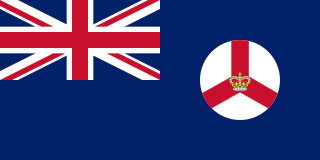
Elections in Angola take place within the framework of a multi-party democracy and a presidential system. The National Assembly is directly elected by voters, whilst the leader of the largest party or coalition in the National Assembly automatically becomes President. The country is currently a one-party dominant state, with the MPLA as the dominant party.

The Colony of Singapore was a British Crown colony that existed from 1946 until 1963, when Singapore became part of Malaysia. When the Empire of Japan surrendered to the Allies at the end of World War II, the island was handed back to the British in 1945. In 1946, the Straits Settlements were dissolved and Singapore together with the Cocos-Keeling and Christmas islands became a separate Crown colony. The colony was governed by the United Kingdom until it gained partial internal self-governance in 1955.
Bernard Mate was a Kenyan politician and one of the first group of Africans to be elected to the Kenya Legislative Council (LegCo), the then legislative arm of government in the British Colony of Kenya, representing what was the black constituency of Central Kenya. He served three terms in Kenya's Parliament finally losing in 1979. He died on 6 January 1994, after a short illness. As a politician, he was part of the KADU's delegation to Kenya's Lancaster House Constitutional conferences. He was described by Oginga Odinga as a being a philosopher.
The Communist Party of Kenya (CPK) is a political party in Kenya.

A series of by-elections were held in Kenya on 11 and 12 June 1966, becoming known as the "little general election". They followed the defection of 29 members of the Kenya African National Union (KANU) to establish the Kenya People's Union. As a result, the KANU government passed a constitutional amendment to force the MPs to seek re-election. Although the KPU received the most votes in the by-elections, KANU won more seats.

The Kenya Indian Congress (KIC) was a political party in Kenya.
Sir Michael Blundell was a Kenyan farmer and politician who served as a member of the Legislative Council from 1948 until 1963, and as Minister of Agriculture in two spells between 1955 and 1962.

The United Country Party was a political party in Kenya.

The Kenya Freedom Party was a political party in Kenya.

The African People's Party (APP) was a political party in Kenya.

The Party of Independent Candidates of Kenya (PICK) is a political party in Kenya.

The Kenya Social Congress (KSC) is a political party in Kenya.

The Kenya National Democratic Alliance (KENDA) is a political party in Kenya.

The Independent Group of Members of the Legislative Council was a right-wing political party in Kenya.

The Kenya Independence Movement (KIM) was a political party in Kenya.

The Kenya National Party (KNP) was a political party in Kenya.
The Devonshire White Paper was a document written in 1923 by the colonial secretary Victor Cavendish, 9th Duke of Devonshire, regarding the status of settlers and natives in the Kenya Colony. The paper stated that whenever the interests of the native Africans clashed with those of Asian, European, or Arab settlers, those of the Africans should prevail. Although the Paper had little effect on the welfare of native Africans, it nonetheless set a precedent for future conflict resolution between the various groups living in the colony.




